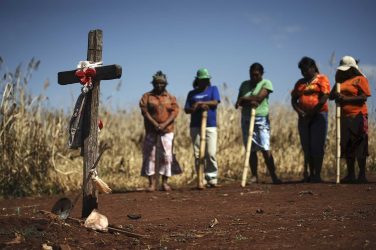Another Candomble religious ground has been plundered and burned, this time in the town of Luziania, located on the periphery of Brazil’s Federal District. None of the fourteen family members who live on the terrain were injured and nobody has been detained in the attack.
Images of Orixas, a pantheon of African deities and a living area were destroyed by the fire. Objects were broken or toppled in an annex area used as a kitchen.
“Material damage can be recuperated,” said Viviane Correia, head of the household. However, she raised concern about the possibility of her family members being attacked. “What will happen if we are the victims of more intense repression?”
Mother Saint Rosimeire Correia, who also lives on the religious terrain, said the fire started in the middle of the night, when everybody was asleep.
She stressed that this is the second time the religious terrain has been attacked. The first occurred in 2013 when criminals committed the same deed, plundering and setting alight the sacred grounds.
Police suspect that last night’s attack was carried out by religious intolerant criminals, according to Revista Forum.
“The first line of investigation revolves precisely around the question of religious intolerance,” said police investigator, Caroline Matos.
She went on to say that the current line of inquiry is based on the theory that the crime was committed by someone familiar with the religious terrain.
Candomble, an African-based syncretic religion in Brazil, empowered newly-formed autonomous communities known as quilombos and served as a religious tapestry that maintained ethnic and religious ties among African descendants throughout Brazil.
Discontented with the imposition of colonial rule that went as far as preventing the expression of their religious worldview, Africans substituted the names of their Orixas (Yoruba deities) to Catholic Saints. The binary syncretism, which disguised their veneration, insured safety among worshippers.
The syncretic fusion of African deities and Catholic Saints also occurred in Haiti, Cuba, the southern region of the United States and other parts of the Americas. The practice became known as Santeria in Cuba.
In Haiti and New Orleans, it became known as Voodoo (or Hoodoo). Though they originated in different geographical regions subjugated by vying European colonial powers, the essential aspect of their historical formation and divine worldview are entwined.
teleSUR














